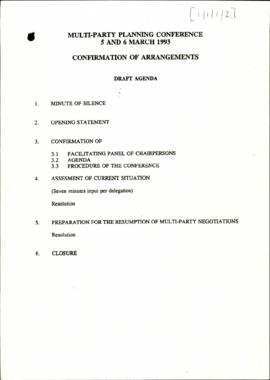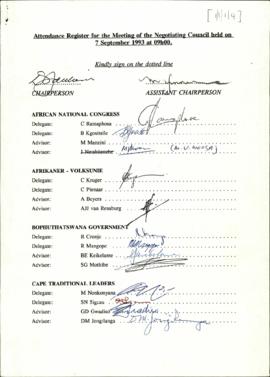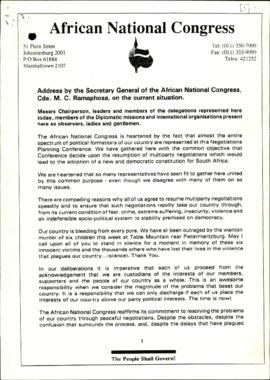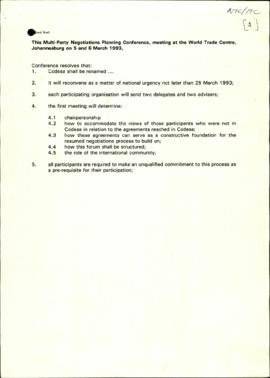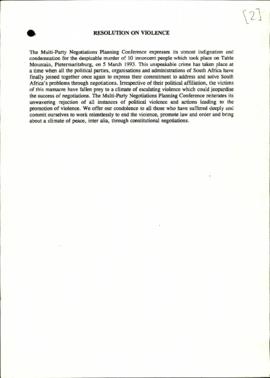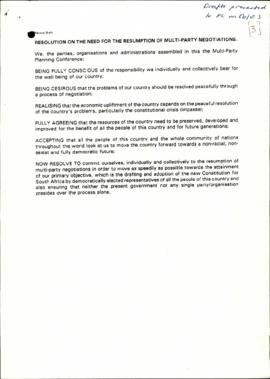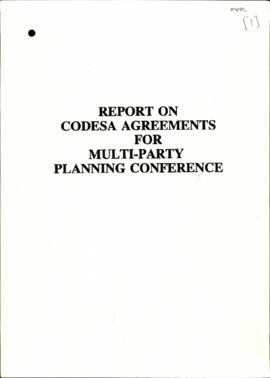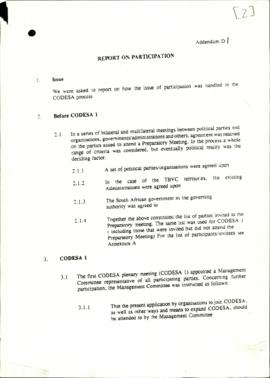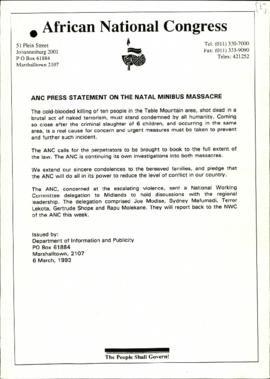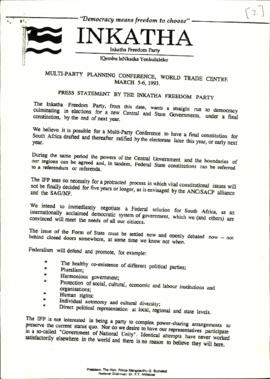Identity area
Reference code
Title
Date(s)
- 1993 (Creation)
Level of description
Fonds
Extent and medium
20, 7 Linear metres of paper records, posters and sound recordings
Context area
Name of creator
Repository
Immediate source of acquisition or transfer
Content and structure area
Scope and content
The Multi-Party Negotiating Process (MPNP) was held during 1993 at the World Trade Centre, Johannesburg. The MPNP was a negotiation process between South African political organisations to establish a transitional government for the creation of non-racial, non-sexist South African constitution. The MPNP wrote Act 200 of 1993: Constitution of the Republic of South Africa, commonly referred to as the Interim Constitution. The Interim Constitution served as a bridging constitution for South Africa, creating a temporal and conceptual space for a constitution to be written by elected representatives of all South African people in the Constitutional Assembly.
The MPNP was a continuation of the Convention for a Democratic South Africa (CODESA). CODESA, meetings between 1991 and 1992 which attempted to establish a transitional government and constitution to end apartheid. By June 1992 CODESA came to a deadlock and negotiations halted. A general consensus grew on the need to resume multi-party talks in 1993 especially motivated by acts of violence, intimidation, and economic hardship.
Talks recommenced with the Multi-party Planning Conference on 5 and 6 March 1993. The Planning Conference focused on re-commitment by all parties, and intended to create the mechanism necessary for the drafting and adoption of a new constitution for South Africa by democratically elected representatives. The first meeting of all delegates to the new negotiation process was the Multi-Party Negotiating Forum on 1 and 2 April 1993.
In the lead up to the Negotiating Forum meeting, the Facilitating Committee and the Sub-committee of the Facilitating Committee were formed to plan the negotiating process. These committees were renamed the Negotiating Council and the Planning Committee and became core negotiating and formulating bodies of the MPNP.
The Negotiating Council named the negotiation process and plenary the Multi-Party Negotiating Process on 3 May 1993. It later established the Transitional Executive Council (TEC) to implement the Interim Constitution in 1994 and was ultimately responsible for the negotiating, drafting, and finalising the Interim Constitution as endorsed by the MPNP Plenary.
The Negotiating Council formed seven technical committees to assist in the drafting for specific themes and areas of concern. Commissions were established for areas requiring public consultation or further negotiations under the direction of the Negotiating Council. The Negotiating Council and Planning Committee reported to the Negotiating Forum.
The Negotiating Forum became the highest body under the direction of the MPNP Plenary. The Multi-Party Negotiation Process Plenary, was a widely representative body of South African leaders and political parties who confirmed and amended agreements reached by all other negotiating bodies of the MPNP.The Negotiating Forum instructed and supervised the negotiating process occurring within the Negotiating Council. The resulting drafts for the Interim Constitution were presented to MPNP Plenary for endorsement or amendment.
The Archive of the Multi-Party Negotiation Process has 13 series.
The series Planning Conference contains the materials produced for the meeting of the Multi-Party Planning Conference on 5 and 6 March 1993 and the resulting documents from that meeting. Additionally summaries of agreements from the proceedings of CODESA can be found here.
The series Applications contains correspondence from parties and organisations agreeing to participate, and requesting representation in the MPNP.
The series Technical Committees contain the working documents of all seven technical committees and their general management materials.
The series Planning Committee contains the working documents of the Planning Committee and its Sub-committee.
The series Negotiating Council contains the the minutes, delegation packs, reports and resolutions of Negotiating Council. Resolutions from the Planning Conference can also be found here.
The series Negotiating Forum contains the minutes, delegation packs, reports of the Negotiating Forum. Resolutions that define the operating procedure and decision making process of the MPNP can also be found here.
Within the series Plenary can be found the final versions of bills drafted by all other bodies of the MPNP as well as resolutions and adoptions of those bills. The MPNP had one Plenary session on 17 November 1993.
The series Women Representatives contains material from the Meeting of the Women Representatives of Participating Parties in the Multi-Party Negotiation Forum on the 26 and 31 March 1993. These meetings framed the terms on which women were included in the MPNP.
The series Communications Committee contains the minutes and drafts of the Communications Committee, planning documents for the attendance of media and draft codes of conduct for media attending meetings of the Multi-Party Negotiating Process and its bodies.
The series Demarcation of State, Provinces and Regions contains a variety of materials and audio related to the multi-phase investigation conducted by the Commission of the Demarcation of State, Provinces and Regions.
The series Commission on National Symbols contains a small digitised subset of public submissions made to the Commission on National Symbols, including the National Anthem and Coat of Arms.
The series Audio Recordings of the Negotiating Council Meetings contains the digitised audio from cassette recordings of Negotiating Council and the Facilitating Committee meetings.
The series Miscellaneous Records primarily contains reference materials from the Convention for a Democratic South Africa (CODESA) used during discussions by various structures of the MPNP and other uncategorized materials.
Appraisal, destruction and scheduling
Accruals
System of arrangement
Conditions of access and use area
Conditions governing access
Conditions governing reproduction
Language of material
Script of material
Language and script notes
Physical characteristics and technical requirements
Finding aids
Allied materials area
Existence and location of originals
Existence and location of copies
Related units of description
Notes area
Alternative identifier(s)
Identifier used by the National Archives and Record Service of South African (NARSSA)
Access points
Subject access points
Place access points
Name access points
Genre access points
Description control area
Description identifier
Institution identifier
Rules and/or conventions used
Status
Draft
Level of detail
Partial
Dates of creation revision deletion
Language(s)
- English
Script(s)
- Latin
Sources
Archivist's note
Archive of the Multi-Party Negotiation Process was digitised as the result of a partnership between the National Archives and Record Service of South Africa (NARSSA) and the Constitution Hill Trust (CHT). Digital capture of documents and manuscripts was undertaken by African Media Online (AMO), and the capture of audio by Forensic Audio.


